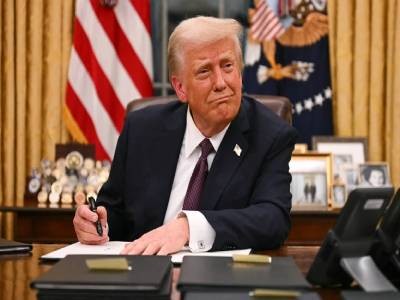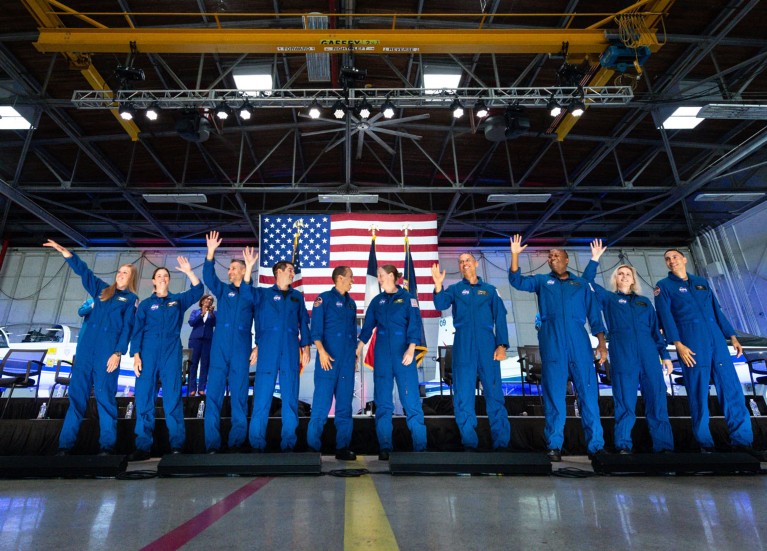NASA’s diverse astronaut corps was an example of the agency’s support for diversity and inclusion.Credit: James Blair/NASA/JSC
In the corridors of NASA buildings across the United States, Pride flags and pictures celebrating women in science are being taken down. Scientists are adding space-mission stickers to their laptops to cover ones that displayed rainbows and other symbols of LGBT+ support. Employees are stripping pronouns from their e-mail signatures and holding darkly humorous conversations in which they try to avoid saying any pronouns at all.
These and other changes are rippling through NASA, which is purging programmes involving diversity, equity and inclusion (DEI) throughout the agency. The directive to do so came from US President Donald Trump, who on 20 January issued an order to eliminate DEI initiatives across the federal government.
“I get a sinking feeling in my stomach when I have to check my [work] email,” says an early-career NASA scientist, who asked to remain anonymous because of concerns about their career prospects. “Every time I reload it, it’s like ‘oh god, will there be some new heinous missive in there?’”

What Trump’s flurry of executive orders means for science
Nature spoke with scientists inside and outside NASA about the impacts of its DEI changes — and heard anger, fear and confusion. Although the orders affect all federal agencies, they are keenly felt at NASA, which has a long history of working towards inclusivity. In 2020, Trump appointee Jim Bridenstine, then head of NASA, added inclusion to the agency’s list of core values, joining safety, integrity, teamwork and excellence. That fifth value has now been removed from many NASA websites.
“How do you go from something being so important that it’s a pillar [of the agency], to being so reviled that it’s off of everything?” asks Julie Rathbun, a planetary scientist at Cornell University in Ithaca, New York.
“It feels like a betrayal by NASA,” says Kas Knicely, a planetary geophysicist at the University of Alaska in Fairbanks. “It’s inefficient, it’s wasteful, and it’s also just messed up.”
In a statement, NASA said the agency “is committed to engaging the best talent to drive innovation and achieve our mission for the benefit of all. As new guidance comes in, we’re working to adhere to new requirements in a timely manner.”
A changed agency
NASA’s push towards inclusivity is one of the most visible in the US government. In the 1950s and 1960s, all of the agency’s astronauts were white men. By 1978, it had bowed to internal and external pressure and had chosen several women and people of colour to fly to space. Today, NASA’s astronauts, as well as its world-renowned scientific and engineering teams, are measurably diverse.
But signs of NASA’s efforts to make space for everyone are disappearing. These removals have been triggered both by official edicts — such as the requirement to remove pronouns from employees’ email signatures — and by unofficial notices, such as verbal suggestions to remove flags or other displays from workspaces.

‘Mind-boggling’: US CDC orders gender-related terms cut from scientific papers
Trump’s changes have also halted projects by employee affinity organizations ― groups ranging from military veterans, to Asian Americans and Pacific Islanders, to Black employees. Before 20 January, NASA celebrated these groups’ efforts with many glowing, now-deleted web articles.
“The work these groups did was wholesome and good for the agency — things like, discussing how do we publish data in a way that works with screen readers, so people with visual disabilities can get at our content,” says a senior NASA scientist, who requested anonymity to avoid possible reprisals. “Or bringing Star Trek legends in to inspire the workforce.” Pausing the work of these groups “promotes fear”, the scientist says, because employees worry that they might be targeted for participating.
Other cancellations include a programme that paired undergraduates from underrepresented groups with active planetary missions, giving the students a chance to observe scientists at work.
Many NASA employees are angry about the changes to DEI, but are buckling down to work nevertheless. “We believe in the mission, and we know that our work is important,” says the senior scientist. “We know that it matters for the nation.”
Grassroots protest
As federal workers, NASA employees can’t push back against the changes, no matter how much they personally support DEI efforts, says Knicely, who co-chairs a community working group on best practices for DEI at NASA. But space scientists outside NASA are voicing their frustration with the agency’s rejection of years of progress towards a more diverse community. Several of them wrote an open letter to NASA leadership on 6 February protesting the changes, which has garnered more than 1,000 signatures.
Source link
Read More
Visit Our Site
Read our previous article: Agent’s Take: Key early 2025 NFL offseason dates with contractual and potential salary cap ramifications
